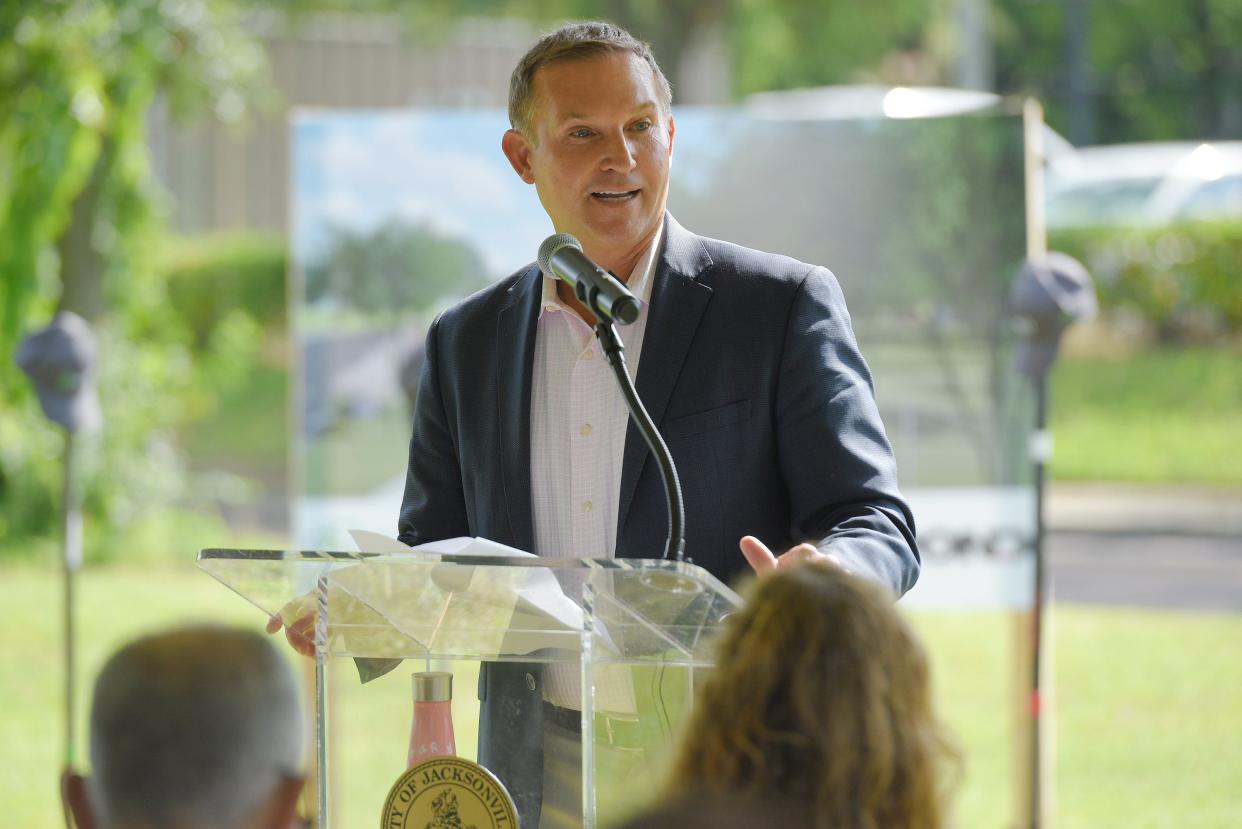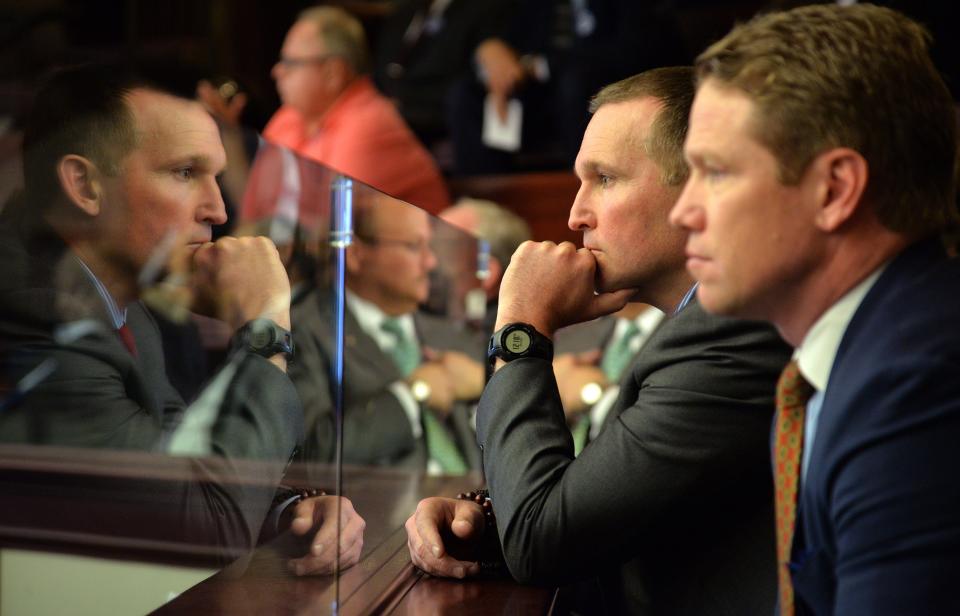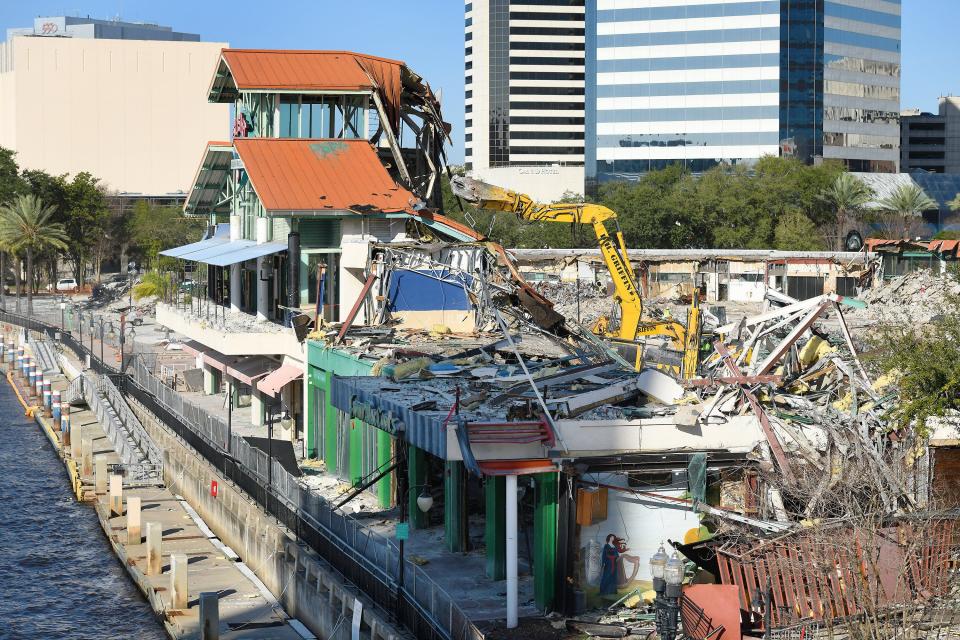Mayor Lenny Curry's eight-year run ends. What were his biggest wins and losses?

- Oops!Something went wrong.Please try again later.
From day one, Mayor Lenny Curry sounded a note of urgency.
"The reality is four years will be gone in the blink of an eye," he said in his inauguration speech on July 1, 2015. "We must act quickly. We must act with purpose."
A re-election win in 2019 gave him another four years in office, making him the fifth mayor to serve consecutive terms since Jacksonville became a consolidated city-county government in 1968.
Now, time is up on a tenure that saw Curry win voter approval for a half-cent sales tax for pension debt just 14 months after taking office, and then support the JEA sales attempt that ended up imploding in scandal in the opening months of his second term.
History in photos: A look back at Lenny Curry, Jacksonville mayor (2015-2023)
Nate Monroe: Will Mayor Lenny Curry's legacy ever escape the shadow of scandal?
Last hurrah budget: Mayor Curry's proposed $1.55 billion budget calls for reduction in property tax rate
Term limits prevented him from running again. Donna Deegan won the race to replace him.
Curry set out to rejuvenate City Hall's ability to pay for projects like street paving, drainage, parks, septic tank phaseouts and civic buildings. That kind of work got a huge lift when John Delaney won backing for the Better Jacksonville Plan as mayor in 2000, only to lose steam when the fallout of the Great Recession forced painful budget cuts while John Peyton and then Alvin Brown occupied the mayor's office.
"If you're going to look at some of the top administrations since consolidation for infrastructure investment, the Delaney administration certainly ranks very high, but so does the Curry administration," said Rick Mullaney, director of the Public Policy Institute at Jacksonville University.
He said Curry's legacy also could include progress in downtown development, collaboration with Jaguars owner Shad Khan on building out the sports complex, and pension reform.
The flip side, Mullaney said, was the JEA sales attempt that launched three weeks after Curry took the oath for his second term and crashed out by Christmas.
Mullaney said a 134-page report by a City Council investigative committee about the JEA sales process "lays out in some detail his role as the driving force behind the proposed sale of the JEA, and it wasn't transparent. So I think part of the legacy will be the failed sale of JEA."
University of North Florida political science professor Michael Binder said Curry's legacy could "easily be the the failed JEA sales attempt" or, on the upside, it could be downtown development if construction happens on riverfront sites where the city tore down buildings like the Jacksonville Landing, leaving behind grass-covered tracts for redevelopment.
"If they don't ultimately happen, it's going to be 'Lenny's Lawn' and failed downtown investment," Binder said.
Curry declined a Times-Union request for an interview about his time as mayor.
Here are some of the main initiatives launched by Curry and how they could factor into his legacy when future historians assess his chapter in the ongoing story of Jacksonville.
More money for civic buildings and infrastructure
Jacksonville’s budget had a paltry $20 million for capital improvement projects the year before Curry took office, an amount more fitting for a sleepy town than the nation’s 11th largest city.
By the final year of Curry’s tenure, the capital improvements program had grown to a $513 million budget, putting tax dollars into neighborhood-based projects.
The projects don’t have a well-known collective name like the Better Jacksonville Plan that Delaney did as mayor for his signature project. But like the Better Jacksonville Plan that transcended Delaney's time as mayor, the projects championed by Curry will continue to move forward after he leaves office because of the time it takes to go from design to construction.
“Even though the mayor’s administration is coming to an end, the next mayor will have a lot of ribbon-cuttings to attend, all thanks to the investment we’re making right here and right now,” Deputy Chief Administrative Officer Charles Moreland said in May at a ground-breaking ceremony for a San Marco flood control project.
The growth in the city’s ability to pay for an expanded list of projects came partly from the federal government’s pandemic relief assistance and from the strong economy that has generated more tax dollars.
But it’s also a result of two taxes Curry embraced. He won 65% support from voters in August 2016 for a half-cent sales tax that will kick in after the Better Jacksonville Plan sales tax ends, which will happen no later than the end of 2030.

Even though the Curry-supported sales tax aimed at paying down the city’s huge pension debt didn’t start right away, Curry convinced the state Legislature to let Jacksonville count future sales tax revenue as a credit for annual contributions to the city’s underwater pension funds.
That allowed the city to keep its annual pension costs from eating up the budget, freeing up hundreds of millions of dollars for other city needs. The trade-off has kept the city from making headway on closing big gaps between what the funds have in the bank compared to what they’ll need to pay for future pension obligations, but when the half-cent sales tax starts flowing to pay down the pension debt, that will boost the funding levels.
Mullaney said it was a "remarkable political accomplishment" to take on such a big crisis by gaining support from the state Legislature, the City Council, voters in a tax referendum, and then unions for negotiations that resulted in the city ending pensions for employees hired after Oct. 1, 2017.
"We're going to have to see how it works out in the years to come, but it was very, very significant," Mullaney said.
In 2021, Curry backed a second tax that doubled the local 6-cents per gallon gas tax to 12 cents per gallon. That Jobs for Jax plan will support dozens of projects by the city and the Jacksonville Transportation Authority, and it marked a turnaround for Curry to back a tax increase.
"The idea that elected officials shouldn't change their minds or evolve on issues or solutions to me is insane," he said at the time. "If you're not evolving or changing your mind in your family or your business, you're not going to be getting along with anybody or getting anything done."
The biggest gas tax-funded projects are the conversion of the downtown Skyway system so it can carry passengers on both the elevated system and at street level, and also the long-discussed construction of the Emerald Trail. The Emerald Trail will build miles of paths for walking and bicycling through neighborhoods bordering downtown, connecting them and making Hogans Creek and McCoys Creek scenic byways.
The JEA saga
The attempted sale of JEA also will have tremors behind Curry’s last day in office, though not in a way that would be a good part of any mayor’s legacy.
Curry supported the decision by the JEA board, whom he appointed, to put the city-owned utility up for sale. Five months later, he called on the board to pull the plug and reject all offers for the utility after he said the public had lost confidence.
If the sales process had continued and reached the next stage of a voter referendum on whether the city should sell the utility to the top-ranked bidder, it would have set the stage for Curry to bring his formidable campaign skills to bear on an election that would have defined his legacy.
It would have been an uphill battle to win voter approval. Polls consistently showed during the sales process that residents didn’t want the city to sell JEA. Binder said he doesn’t think the referendum would have passed if it had gotten that far, but he said Curry had overcome the odds, it would have fundamentally changed the structure of city government and pumped billions of dollars into the city’s treasury.
"Would that have been his legacy? Without question," Binder said.
Instead, the sales attempt spawned criminal investigations that resulted in federal indictments of ousted JEA CEO Aaron Zahn and the utility’s former chief financial officer Ryan Wannemacher in connection with an incentive plan that could have paid financial windfalls to JEA employees in the event of a sale.
Murders rise
Even without the massive proceeds that would have come from selling JEA, Curry was able to rebound and get the Jobs for Jax program passed by City Council with the gas tax increase.
He found it far harder to move the needle on violent crime, even though he made it the centerpiece of his campaign in 2015 when he defeated Brown. Curry vowed that as mayor, he would turn the tide on murders and other violence he blamed on Brown.
The strategy made political sense because voters cited crime as their biggest concern, ahead of the economy. Fast forward eight years and voters still worry most about crime, according to UNF polls.

Murders rose sharply during Curry’s term. From 2011 to 2015, the worst year for murders in Duval County was 97 in 2015. With Curry as mayor, the number of murders went up and crested at 143 murders in 2020, according to the most recent annual figures available from Florida Department of Law Enforcement reports.
The Jacksonville Sheriff’s Office, which covers most of Duval County, investigated 135 murders committed in 2022, according to its records.
On the broader measures of violent crime – a category that covers murder and manslaughter, aggravated assault, robbery and forcible sex – the worst year during Brown’s tenure was 2014 with 659 cases per 100,000 residents, according to Florida Department of Law Enforcement reports.
During Curry’s tenure, Duval County’s most violent year was 2020 when there were 678 cases per 100,000 residents.
Binder said Curry increased JSO's budget but "that's not something to hang your hat on" if residents don't see results.
"It certainly could be better and if there were big strides made, I think there would be less attention to it on the local news and less talk about it, and people would be less concerned," he said.
Downtown residential growth picks up steam
If crime was the hallmark of Curry's 2015 campaign, downtown development became his rallying cry after his re-election in 2019.
"You will not recognize downtown in four years," he said at his election night party.
The city has had a solid run of residential growth with 24 residential projects opened or under construction since 2018, bringing thousands of new residents into downtown, especially the Brooklyn neighborhoods where that residential growth was joined by construction of a new FIS headquarters.
But the historic district of downtown that is the most walkable area and most closely identified with what people think of as downtown has been slower going. The Laura Street Trio still stands vacant, and the shift to more remote work has cut down on the number of people working in downtown offices on any given weekday.
The city demolished The Jacksonville Landing, the old county courthouse, and the vacant City Hall Annex. No redevelopment has happened yet on any of those sites, though Curry's budget contained funding for building a new park on Riverfront Plaza, the name for the land where the Landing once stood. Construction of the park and associated bulkhead work is set to start the day after the Fourth of July.

"Unfortunately for Lenny Curry, he might not get credit for the things that come out of the ground, but I think he's done a lot to poise downtown for the future," Mullaney said.
In the sports complex part of downtown, Curry partnered with Jaguars owner Shad Khan to build the Daily's Place amphitheater and the Miller Electric Center football training complex. Khan's planned Four Seasons Hotel and Residences broke ground on the riverfront across the street from the football stadium. The Museum of Science and History will build a new museum on The Shipyards site that has been abandoned for years, and Curry's final budget contained money to make the rest of the Shipyards into a park.
He also got council support for extending the riverwalk through The Shipyards all the way to the Four Seasons site and Metropolitan Park, which will be the first addition to the riverwalk since 2005.
Curry worked with the Greater Jacksonville Fair Association on an agreement for the fairgrounds to move to new digs on the Westside. The fairground site, which Khan will purchase, is among the possible destinations for a University of Florida graduate campus that Curry successfully pursued in his final year in office.
A plan for building an entertainment district on Lot J near the stadium failed, leaving that as something Deegan will consider as part of negotiations with the Jaguars for a renovated football stadium and extension of the team's lease to play in the stadium.
The football stadium might have seemed tailor-made for Curry, a die-hard Jaguars fan who showed up at team practices and traveled to watch the team play road games.
"In a lot of ways, it surprising to me that the stadium deal didn't get done under his watch," Binder said. "That would have been his legacy, for better or worse, and would be signed and sealed."
But mayoral terms like football games have a beginning and end. Time ran out. Curry will be watching from the sidelines on those talks when Deegan takes over as mayor.
This article originally appeared on Florida Times-Union: Jacksonville Mayor Lenny Curry ends his time leading City Hall

